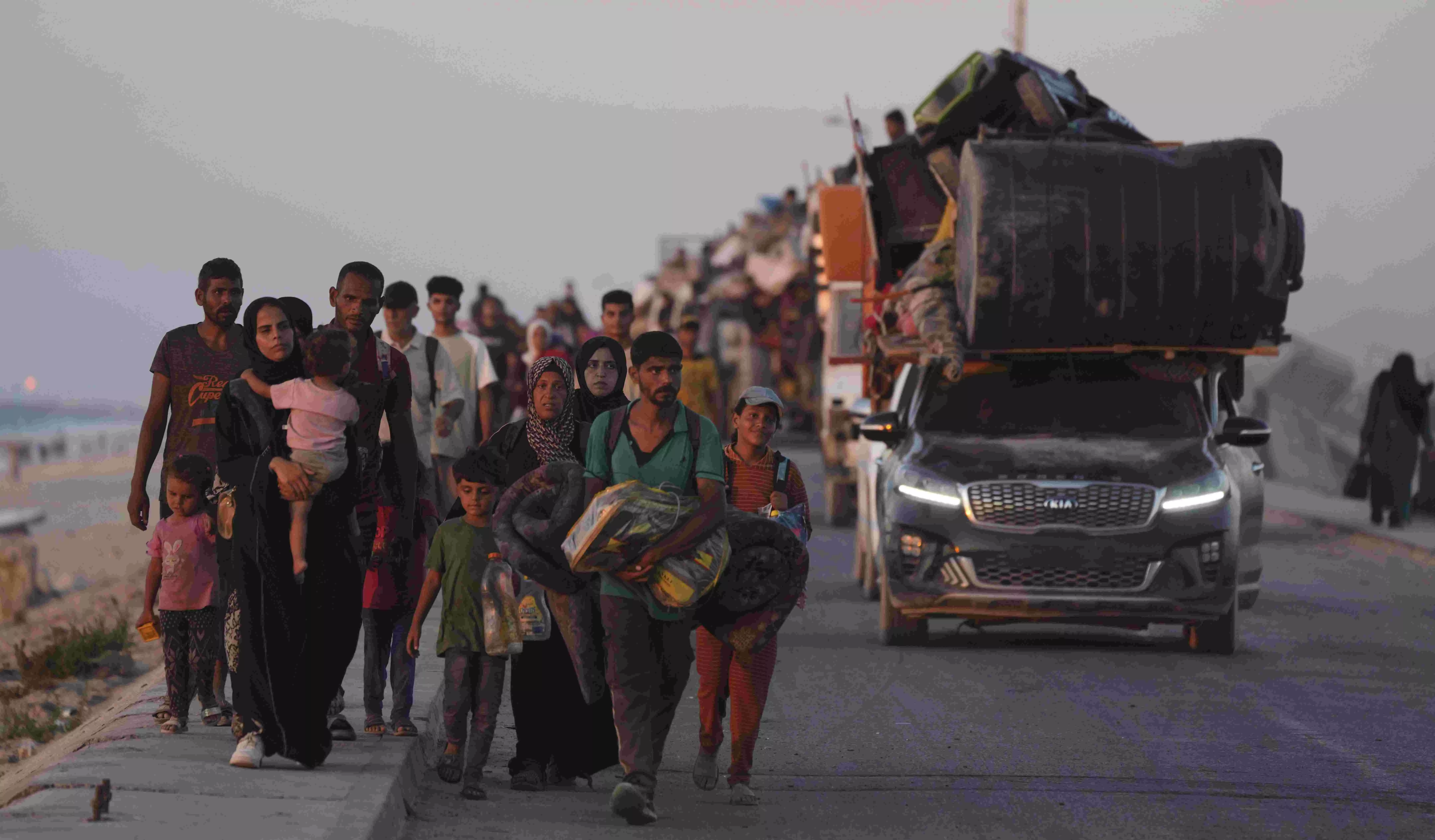The Long Road to Peace
In a historic UNGA vote, 142 nations endorsed the New York Declaration backing a two-state solution, with India’s support marking a break from its earlier Palestine stance

On September 12, 2025, the UN General Assembly (UNGA) voted in favour of a resolution that endorsed the ‘New York Declaration’ on peaceful settlement of the Palestine issue and implementation of the two-state solution between Israel and Palestine. The resolution was adopted with an overwhelming 142 nations voting in favour, 10 against, and 12 abstentions. Those voting against included Israel, the United States, Argentina, Hungary, Micronesia, Nauru, Palau, Papua New Guinea, Paraguay, and Tonga.
The New York Declaration (July 29) is a resolution of the leaders and representatives of different nations who gathered at the United Nations in New York on 28-30 July 2025, at a historically critical moment, for peace, security, and stability in the Middle East. The conference was co-chaired by the French Republic and the Kingdom of Saudi Arabia. India has voted in favour of a resolution which marked a shift from its historical position on Palestine.
As of 2023, 28 of the 193 UN member states did not recognise Israeli sovereignty; 25 of the 28 non-recognising countries were located within the Muslim world, with Cuba, North Korea, and Venezuela representing the remainder. The prominent countries that did not recognise Israel were: Indonesia, Qatar, Saudi Arabia, Iran, Iraq, Syria, Malaysia, Bangladesh, and Pakistan. By casting their votes in favour of the latest UNGA resolution on the ‘two-state solution’, most of these nations have essentially recognised the state of Israel.
The UNGA declaration, among others, called on the Israeli leadership to issue a clear public commitment to the two-state solution, including a sovereign and viable Palestinian state. It also urged Israel to “immediately end violence and incitement against Palestinians, to immediately halt all settlement, land grabs and annexation activities in the Occupied Palestinian Territory, including East Jerusalem, publicly renounce any annexation project or settlement policy, and put an end to settlers’ violence”. Reacting to the UNGA resolution, Israel’s Prime Minister Netanyahu said, ‘there will be no Palestinian state’. He has officially moved forward with a settlement expansion plan in the occupied West Bank that would make any future Palestinian state virtually impossible.
BIRTH OF ISRAEL
It may be recalled that India voted against the resolution in the very first UN Resolution on the two-state solution of Palestine, adopted by the UNGA on November 29, 1947. The United Nations Partition Plan for Palestine was a proposal by the United Nations to partition ‘Mandatory Palestine’ at the end of the British Mandate. Drafted by the U.N. Special Committee on Palestine (UNSCOP), the Plan was adopted by the UN General Assembly as Resolution 181 (II). ‘Mandatory Palestine’ was a British administrative territory that existed between 1920 and 1948 in the region of Palestine.
The resolution recommended the creation of independent but economically linked Arab and Jewish States and an extraterritorial “Special International Regime” for the city of Jerusalem and its surroundings. Along with India, most of the Arab states voted against the 1947 resolution of the two-state solution. The resolution got 33 votes in favour, 13 nations voted against the resolution, and 10 member nations abstained from voting. Thus, the state of Israel was established in the Arab land as two-thirds of the members of the UNGA voted in favour of the resolution.
Armed with the UNGA resolution, Israel declared independence on May 14, 1948. At the time when the UN passed its decision to partition Palestine, 93 per cent of the arable land was owned by Arabs, and 7 per cent by Jews. The land allocated to the Arab State in the final plan encompassed approximately 43 per cent of Mandatory Palestine and consisted of all the highlands, except for Jerusalem, as well as one-third of the coastline. The Jewish State allocated to the Jews, who constituted a third of the population and owned about 7 per cent of the land, was to receive 56 per cent of Mandatory Palestine, a slightly larger area to accommodate the increasing numbers of Jews who would immigrate there. The Jewish State would also be granted sole access to the Sea of Galilee, a crucial source of water, and the economically important Red Sea.
On May 11, 1949, the UN General Assembly adopted Resolution 273, admitting Israel as a full member state with 37 votes in favour, 12 against, and 9 abstentions. However, its admission was conditional on the acceptance and implementation of UN resolutions, particularly Resolution 181 (the Partition Plan).
Since January 2013, following United Nations General Assembly resolution (67/19), the Palestinian Authority has used the name “State of Palestine” as the “representative of the Palestinian people”. The UNGA resolution (67/19) was adopted on 28 November 2012 by a vote of 138 For, 9 Against (including Israel, United States, and Canada), 41 Abstaining, 5 Absent. The resolution accorded Palestine the status of a non-member observer State in the United Nations, based on the Palestinian people’s right to self-determination. It further reaffirmed the United Nations’ commitment to a two-state solution to the Israeli–Palestinian conflict based on the pre-1967 lines. The resolution was adopted on the 65th anniversary of UNGA Resolution 181.
THE MESSIANIC SETTLER MOVEMENT
It is argued that ‘settler colonialism’ is like a gas that expands to fill all available space. But unlike a gas, it needs an ideology and preferably a strategy. The Zionist leaders had a very clear view on the strategic importance of the messianic settlement movement, a strain of religious Zionism that combines nationalist ideology with a belief that settling the Land of Israel is a key step toward bringing about messianic redemption.
The core philosophy of this movement was most succinctly formulated by its supreme strategist, Ben-Gurion, in a letter to his son Amos dated October 5, 1937. In that letter, he explained why he was ready to accept the Peel Commission report (July 1937), which offered the Jewish settlers a state on a portion of Palestine. He wrote: “We shall build a multi-faceted Jewish economy—agricultural, industrial, and maritime. We shall organise an advanced defence force—a superior army which I have no doubt will be one of the best armies in the world. At that point, I am confident that we would not fail in settling in the remaining parts of the country, through agreement and understanding with our Arab neighbours or through some other means”.
A few hours after the declaration of Israel’s independence, armies of Egypt, Trans-Jordan, Iraq, and Syria fought with Israeli troops inside the area of Mandatory Palestine, thereby starting the 1948 Arab–Israeli War. On 24 July 1949, an armistice agreement with Syria was signed. But by then, Israel had increased its land area by almost 50 per cent compared to the 1947 UN Partition Plan.
At present, only around 22 per cent of the ancestral homeland of Palestine is under the official control of the Palestinian National Authority (PNA) — the Fatah-controlled government body that exercises partial civil control over the Palestinian enclaves in the Israeli-occupied West Bank. Since 1967, from the very day Israel occupied the West Bank, including East Jerusalem and Gaza, it has complicated efforts to resolve the Israeli–Palestinian conflict.
The messianic settler movement is challenging the state and its actions regarding the territories Israel captured over the years. Analysts argue that supporting the messianic settler movement has not offered Israel significant strategic benefits. In fact, it has backfired by intensifying the conflict with the Palestinians, weakening Israel’s international standing, and undercutting state authority domestically. Unimpeded genocide in the occupied Gaza Strip, where over 65,000 Palestinians have been killed during the last two years, is another dreadful example of the messianic settler movement of the Zionists, which has turned Israel into a rogue state.
The UN Commission of Inquiry, after a multi-year investigation, found “reasonable grounds” to conclude that four of the five genocidal acts — killing members of a community, serious bodily and mental harm, actions aimed at destroying the group, and preventing births — have been carried out since the war began following Hamas’s October 7, 2023 attack. On Tuesday, Israel began its long-expected ground assault on Gaza City in the north and stepped up efforts to empty and occupy the city by opening an additional route southwards.
INDIA’S GROWING ISOLATION IN THE MIDDLE EAST
In the past three years, New Delhi abstained four times from UN resolutions calling for a ceasefire in the Gaza Strip, drawing criticism for avoiding direct calls to halt Israeli genocide. The Delhi Police even carried out a lathi charge to disperse students and activists who had gathered to protest in front of the Israeli Embassy. A 77-year-old IIT professor fasting for Gaza was harassed by Delhi Police as he observed a full day of fasting in solidarity with the Palestinians in Gaza.
India and Israel have recently signed a new Bilateral Investment Agreement (BIA) on September 8, 2025, marking a significant step in strengthening their economic, strategic, and technological ties. India’s bilateral agreement with Israel comes as several countries have threatened to review trade treaties with Tel Aviv in the light of its ongoing war in Gaza.
Israel’s unprovoked attack on Qatar (on September 15) has united all the member states of the Arab League and the Organisation of Islamic Countries (OIC), who have unequivocally condemned Israel. Pakistan and Saudi Arabia on Wednesday (September 17, 2025) signed a defence pact under which any aggression against either country shall be considered as an act of aggression against both. This new strategic alignment has created a China-Pakistan-Saudi Arabia axis, which will further isolate India in this region. India’s unholy alliance with Israel indicates the collapse of the foreign policy of the Modi government.



